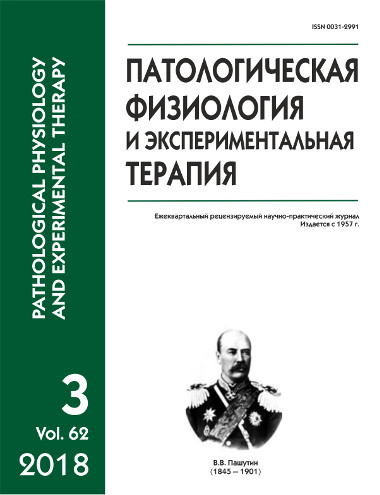Effect of opioid peptides on liver function after patial hepatectomy
DOI:
https://doi.org/10.25557/0031-2991.2018.03.67-71Keywords:
partial hepatectomy, opioid peptides, liver failureAbstract
Aim. The aim of the study was to compare effects of selective agonists of opioid receptors from different classes on the protein-synthesizing function of liver and development of cytolytic and cholestatic syndromes in rats after partial hepatectomy. Methods. The study was conducted on 152 Wistar male rats weighing 200—250 g. The animals were subjected to partial hepatectomy according to the Higgins and Anderson method. Concentrations of total protein, albumin, total bilirubin, and activities of alanine aminotransferase, aspartate aminotransferase, and lactate dehydrogenase were measured in plasma using standard methods. The opioids, DAGO (6.3 mg/kg), DSLET (10.0 mg/kg), and dynorphin A (1-13) (20.1 mg/kg), were injected in 0.2 ml of saline daily for 5 days. Control animals were injected with 0.2 ml of saline for 5 days. Results. Resection of 70% of liver tissue resulted in development of liver failure as evidenced by hyperbilirubinemia, hypoalbuminemia, hypoproteinemia, and increased transaminase and lactate dehydrogenase activities. Selective agonists of opioid receptors administered to the rats after partial hepatectomy exerted a hepatoprotective effect and alleviated the signs of liver failure beginning from the 3rd day after resection. Transaminase and lactate dehydrogenase activities were significantly lower in opioid-treated rats than in the control group. Levels of total protein and albumins were significantly higher in the groups injected with the study peptides compared to the control group on the 7th day after partial hepatectomy. The selective agonist of opioid m-receptors, DAGO, exerted the most pronounced effect. Apparently, the similar effects of peptides were due to their antioxidant and anti-hypoxic action, which alleviated the detrimental effect of liver surgery. The more pronounced effect of DAGO apparently resulted from peculiarities of opioid receptors distribution or peptide resistance to endopeptidase action due to modifications of the peptide molecule. Conclusion. Administration of opioids stimulated restoration of liver functional activity after partial hepatectomy. Injections of the m-agonist, DAGO, produced the most pronounced effect.Downloads
Published
2018-10-05
Issue
Section
Original research
How to Cite
[1]
2018. Effect of opioid peptides on liver function after patial hepatectomy. Patologicheskaya Fiziologiya i Eksperimental’naya Terapiya (Pathological physiology and experimental therapy). 62, 3 (Oct. 2018), 67–71. DOI:https://doi.org/10.25557/0031-2991.2018.03.67-71.






